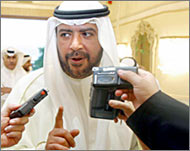Kuwait predicts massive deficit, again
Oil-rich Kuwait has projected a deficit of $9.5 billion for the next fiscal year following five years of massive surpluses, Finance Minster Mahmud al-Nuri said

His remarks were published in the Kuwaiti press on Monday.
Kuwait has projected a deficit in each of the past five fiscal years, but has finished four of them with a huge surplus because of high oil prices and increased production and is on course to do the same this year.
The new budget for 2004/2005, which runs until 31 Marchnext year, projects expenditure at 6.185 billion dinars ($20.62 billion) and revenue at 3.319 billion dinars ($11.06 billion), Mahmud al-Nuri told Al-Qabas daily.
Oil revenues are estimated at 2.735 billion dinars ($9.12 billion), lower than the current year’s estimates of $9.9 billion, while non-oil revenues are projected at 584 million dinars
($1.94 billion).
The draft budget was approved by the cabinet on Sunday and will become effective after it is passed by parliament.
Kuwait, which depends on oil for more than 90% of its income, has calculated the oil revenues on the basis of a conservative price of $15 per barrel, the same as in the current year.
Conflicting figures
In the current 2003/2004 year, Kuwait projected a shortfall of $7.85 billion, but official figures by the finance ministry show that the emirate is heading for a fifth year in a row of healthy surpluses.
The preliminary figures show that in the first three quarters of the fiscal year at the end of December, the budget recorded a surplus of 2.012 billion dinars ($6.71 billion).
Actual revenues reached 5.119 billion dinars ($17.06 billion) against a projected income of 3.555 billion dinars ($11.85 billion).
Expenditures for the year were estimated at 5.909 billion dinars ($19.7 billion), but actual spending after nine months of the year was 3.106 billion dinars ($10.35 billion).
 |
|
Kuwaiti Energy Minister Sheikh |
Economists, however, warn that spending is normally low for most of the fiscal year, but dramatically picks up in the last quarter with most ministries trying to spend their allocated budgets.
The emirate posted 4.53 billion dinars ($15.11 billion) in oil revenues in the first nine months of the year. The sum is larger than budget projections for oil income of 2.97 billion dinars ($9.9 billion).
Oil prices exceeded $26
The average price for Kuwaiti oil has topped $26 a barrel for most of the current fiscal year, and is expected to be higher at the end of the year.
Unofficial reports have also indicated that Kuwait, which has a production capacity of 2.5 million barrels per day (bpd), has been producing above its OPEC quota of just under two million bpd.
Non-oil revenues recorded 585.7 million dinars ($1.95 billion) at the end of December, equal to the budget projections for the whole year.
Local reports have predicted that total revenues at the end of the year would top the six-billion-dinar ($20-billion) mark, almost twice the budget projection.
Between 1990 and 1999, the emirate incurred accummulated deficits of 21.1 billion dinars ($70 billion) and managed a surplus of 63.2 million dinars ($210.1 million) only in the 1996/97 fiscal year.
More than 61% of the deficits however came in the first two years of the last decade to finance the US-led Gulf War to liberate the emirate from seven months of Iraqi occupation.
Kuwait has made a total net surplus of nine billion dollars in the past four fiscal years, in addition to $7.25 billion deposited in the Kuwait Fund for Future Generations (KFFG).
According to law, 10% of total revenues is deducted in favour of the KFFG, managed by the Kuwait Investment Authority (KIA), regardless of whether there is a deficit or surplus.
Since 1990, Kuwait has transferred some $15 billion into the fund.